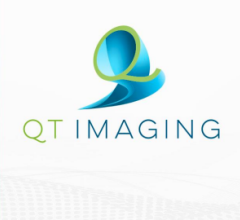
MR images showing reduction in size of metastatic tumors after focused-ultrasound delivery of antibody therapy through blood-brain barrier. Image courtesy of Sunnybrook Health Sciences Centre
October 14, 2021 — In a first-in-world clinical trial, researchers at Sunnybrook Health Sciences Centre in Toronto, Canada, have demonstrated that magnetic resonance (MR)-guided focused ultrasound can be used to safely deliver antibody therapy to breast cancer that has metastasized to the brain.
In this Phase I clinical trial for Her2-positive breast cancer patients, the Sunnybrook team captured images of the antibody therapy, trastuzumab (or Herceptin), precisely targeting tumors in the brain after using Insightec’s Exablate Neuro focused ultrasound device to temporarily and noninvasively open the blood-brain barrier (BBB) and enable intravenous trastuzumab to more effectively access tumor sites.
Antibody therapies can help the immune system fight cancer cells, and they are often used in combination with radiation and chemotherapy. However, the BBB presents a challenge when attempting to target sites in the brain. The BBB is a layer of cells lining blood vessels that protects the brain from viruses, bacteria, and other toxins – but it can also prevent therapeutics, such as trastuzumab, from reaching the brain in high enough concentrations to be effective.
“This is the first visual confirmation that focused ultrasound can improve the delivery of targeted antibody therapy across the BBB,” said Nir Lipsman, M.D., the study’s principal investigator and director of the Harquail Centre for Neuromodulation at Sunnybrook. “These are preliminary, but very promising, results that with continued research have implications well beyond brain cancer for other neurological conditions, including Parkinson’s disease and Alzheimer’s, where the blood-brain barrier poses a challenge to drug delivery.”
The results from the first four patients in this 10-patient trial were published today in Science Translational Medicine in an article titled “MR-guided focused ultrasound enhances delivery of Trastuzumab to Her2-positive brain metastases.”
Metastatic breast cancer, also known as Stage IV breast cancer, starts in the breast and can spread to the brain, bones, liver, or other organs. Current treatments for breast cancer brain metastases include open neurosurgery, radiation, and chemotherapy. However, depending on the location and number of brain metastases, options for surgery and radiation may be limited, and it can be difficult for therapies to effectively reach tumors in the brain.
“The early data in this study suggests delivery of antibody therapy directly to tumors using focused ultrasound may impact treatment efficacy, with tumors slightly decreasing in size, with varying results for patients between 7 and 31 percent during the study – on average to 21 percent,” said Rossanna Pezo, M.D., medical oncologist in the Odette Cancer Centre at Sunnybrook. “The reduction in tumor size is promising but should be interpreted with caution as further research on a larger scale is needed.”
These results set the stage for the possibility of delivering a host of both established and novel therapies for numerous brain conditions that otherwise cannot gain access to the brain.
Sunnybrook is a Focused Ultrasound Center of Excellence – the only Canadian site to be recognized as such by the Focused Ultrasound Foundation, which was one of the funders of this clinical trial.
“The multidisciplinary team at Sunnybrook are pioneers in the use of focused ultrasound to treat a variety of brain disorders,” said Neal F. Kassell, M.D., chairman of the Foundation. “This world-first study demonstrating the effectiveness of focused ultrasound to open the BBB for facilitating delivery of antibodies to the brain is an important milestone in the development of new approaches for treating brain tumors and other neurological disorders. We are pleased to be partnering with this esteemed group.”
For more information: www.fusfoundation.org


 February 06, 2026
February 06, 2026 









